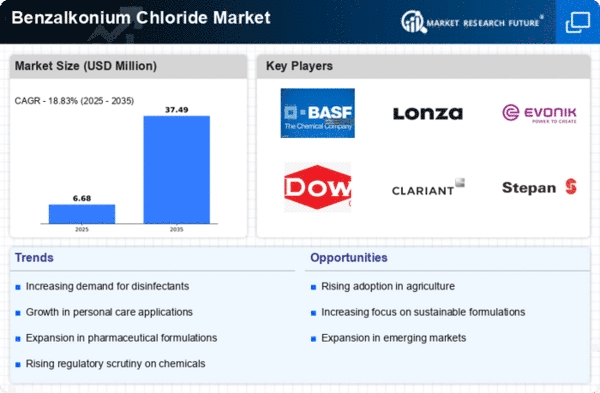Top Industry Leaders in the Benzalkonium Chloride Market
 Benzalkonium chloride (BAC), often shortened to BZK or BKC, is a ubiquitous yet largely unseen hero in the world of hygiene and sanitation. This versatile quaternary ammonium compound acts as a powerful disinfectant, preservative, and anti-static agent, found in countless everyday products from hand sanitizers and household cleaners to cosmetics and contact lens solutions. Understanding the competitive landscape of the benzalkonium chloride market is crucial for both established players and new entrants seeking to capitalize on its diverse applications and immense growth potential.
Benzalkonium chloride (BAC), often shortened to BZK or BKC, is a ubiquitous yet largely unseen hero in the world of hygiene and sanitation. This versatile quaternary ammonium compound acts as a powerful disinfectant, preservative, and anti-static agent, found in countless everyday products from hand sanitizers and household cleaners to cosmetics and contact lens solutions. Understanding the competitive landscape of the benzalkonium chloride market is crucial for both established players and new entrants seeking to capitalize on its diverse applications and immense growth potential.
Strategic Maneuvers for Market Dominance:
Leading players like FeF Chemicals (Novo Nordisk), Dishman India, Jinshan Jingwei Chemical/Taiko Palm-Oleo, and Lonza AG employ a range of strategies to solidify their market positions:
-
Product diversification: Offering a variety of BAC grades with varying purity levels and properties to cater to specific industry needs and regulatory requirements. This includes food-grade, pharmaceutical-grade, and industrial-grade BZK formulations.
-
Technological innovation: Investing in R&D to develop novel BAC derivatives with enhanced efficacy, lower toxicity, and improved environmental sustainability. Research focuses on biodegradable and non-persistent forms of BZK to address environmental concerns.
-
Regional expansion: Targeting high-growth markets like Asia Pacific and Latin America by establishing local production facilities and adapting offerings to regional regulations and preferences.
-
Vertical integration: Gaining control over the supply chain by acquiring raw material suppliers or expanding into downstream applications like disinfectant formulations or impregnated wipes.
-
Strategic partnerships: Collaborating with research institutions, universities, and technology startups to accelerate innovation, address technical challenges, and explore new application possibilities.
Factors Dictating Market Share:
Success in this dynamic market hinges on several key factors:
-
Product quality and performance: Delivering BAC with consistent purity, high efficacy against a broad spectrum of microbes, and compatibility with diverse materials and formulations. -
Cost competitiveness: Balancing high quality with affordability, especially in price-sensitive segments like household cleaning products and institutional disinfectants. -
Sustainability focus: Demonstrating a commitment to eco-friendly BAC production processes, biodegradable formulations, and minimal environmental impact throughout the life cycle. -
Regulatory compliance: Ensuring adherence to stringent regulations regarding BAC safety, handling, and disposal, particularly in food and pharmaceutical applications. -
Technical expertise and customer service: Building strong relationships with clients through responsive technical support, customized solutions, and efficient after-sales support.
Key Players
Stepan Company (US),
Novo Nordisk A/S (Denmark),
Kao Corporation (Japan),
Iwaki Seiyaku Co., Ltd (Japan),
MP Biomedicals (US),
Shanghai Bichain Industrial Chemical Co., Ltd (China),
Quat-Chem Ltd (UK),
Haihang Group (China),
Dishman Group (India),
Bramchem Ltd (UK),
ALPHA CHEMICALS PVT. LTD (India),
TCI Chemicals (India) Pvt. Ltd (India),
SAJMIL CHEMICALS (US),
Innova Corporate (India)
Recent Developments:
-
October 2023: Advancements in nanotechnology enable the development of BAC-based nanocomposites with enhanced antimicrobial activity and reduced environmental impact. -
November 2023: Growing awareness of environmental sustainability fuels demand for bio-based alternatives to traditional BAC production methods. -
December 2023: The increasing focus on healthcare hygiene leads to the development of novel BAC-impregnated textiles and surfaces for infection control.










